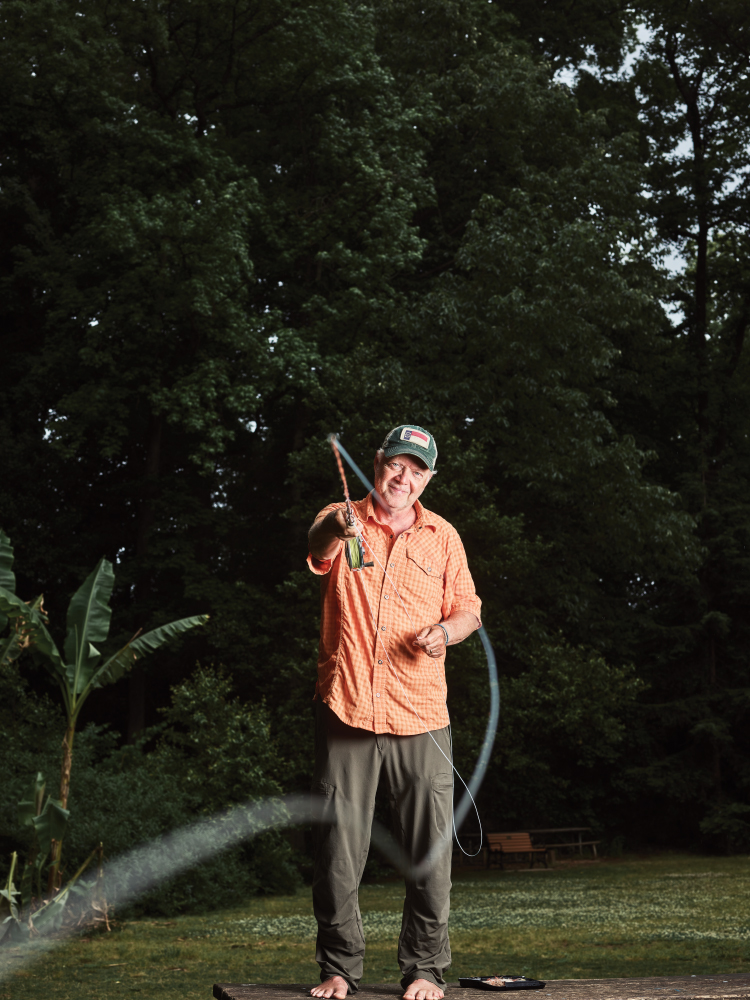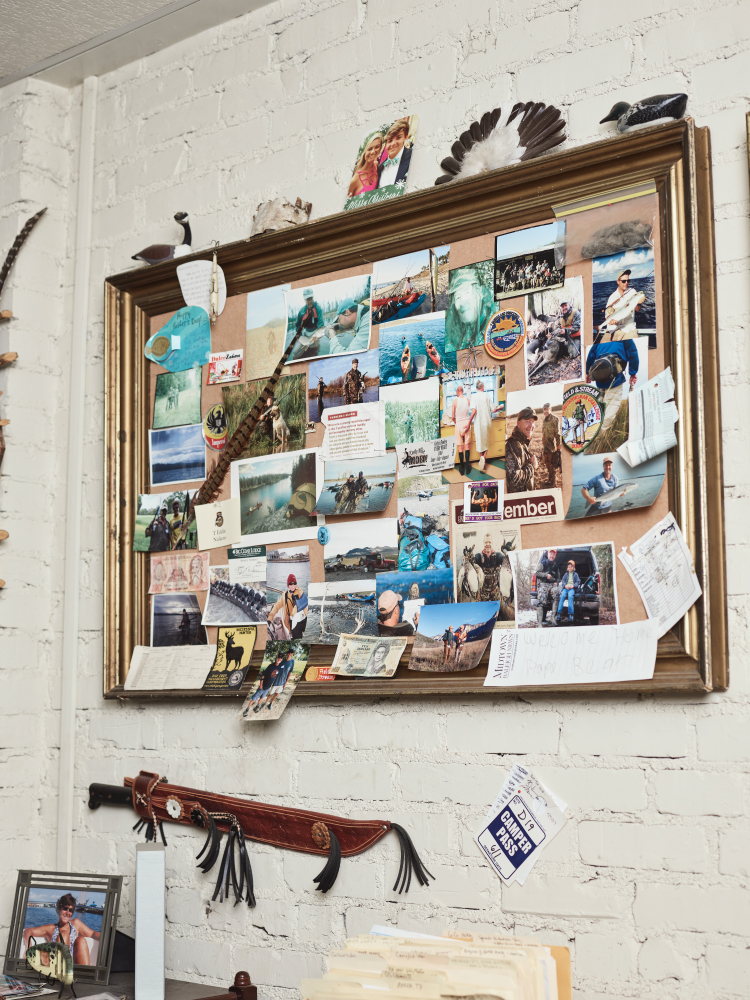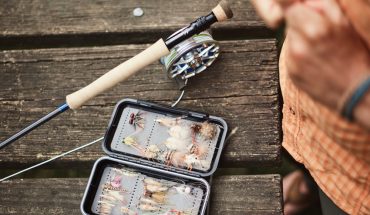In his new book, The Last Wild Road, North Carolina author T. Edward Nickens details a life of outdoor adventures
by Josh Klahre | photography by Joshua Steadman
Down a flight of stairs in an unassuming bungalow in University Park is a veritable temple for the outdoors enthusiast. Here, you’ll find row upon row of steel racks loaded with tree stands, fishing rods, rifles, and bows and arrows. There’s an entire rack dedicated to sleeping bags; another holding 40-plus pairs of boots, each designed for a different outdoor activity, climate, or surface. A full-sized canoe rests on wooden blocks, and huge plastic bins are packed with freeze-dried camping food. There’s a butchering table where, I’m told, hundreds of bagged animals have been cleaned and stripped. A nearby freezer holds the fruit of those labors: moose, venison, multiple species of duck, jackrabbit, squirrel, quail, and bear.
This is the office of Mr. T. Edward Nickens, one of the most accomplished outdoorsmen of our generation, and a New York Times bestselling author of seven books on hunting, camping, and fishing, plus decades of magazine articles on some of the most epic adventures ever captured on the page.
A proud North Carolina native, Eddie, as he’s known, was raised in High Point. At a young age he gravitated to the outdoors. It started by innocently kicking around in his backyard, a 40-mile stretch of forest and stream nestled in the Piedmont. An avid reader of the hunting and fishing magazines of the 1970s, Nickens spent countless hours in those woods shooting, angling, and orienteering. A family friend, Keith Gleason, took him out on his first hunts.
Nickens got degrees in English and journalism at the University of North Carolina at Chapel Hill in 1983, with aspirations of becoming a professional writer. He spent two years after graduation biding his time behind the cash register at Sutton’s Drug Store on Franklin Street, writing essays in longhand. There, Nickens befriended the owner of a building down the way, who happened to be an amateur writer herself. She offered him a deal: if he would clean the office building in the evenings, he could have access to a small office of his own to work in.
Nickens honed his craft sitting at that desk, gazing out the window onto the street below. “It was as close to Hemingway in Cuba as I could imagine at the moment,” he says.
Nickens landed his first professional gig, writing an outdoors column, “Field Notes,” for the weekly Zebulon Record, in the early 1980s. Six months later, he successfully pitched the column to The Chapel Hill News — and with that, became a syndicated columnist. Nickens rode that momentum into magazine writing, leapfrogging around the state for local magazine jobs, mostly down east. He finally landed in Raleigh in 1985. It’s there that he met his future wife, Julie, a few years later, and settled down to start a family. “She’s the glue that holds it all together,” Nickens says.
As his reputation as an outdoors writer grew, so did the bylines — features and regular columns at publications including Field & Stream, Audubon, Men’s Journal, Outdoor Life, Salt Water Sportsman, Our State, and Garden & Gun, many of which Nickens continues to write for regularly. “I attached myself to powerful editors like the bad rash that just won’t go away for them,” he says, in his own self-
deprecating way.

For the outdoors enthusiast, getting paid to write about hunting and fishing sounds pretty darned cushy, but in truth, a lot of work goes into the process. Lining up a trip to less-traveled territory — assignments have brought him to the Luquillo Mountains of Puerto Rico, southwestern Alaska’s Arctic National Wildlife Refuge, and the Chihuahuan Desert of New Mexico — can easily require a solid week of research, lining up travel itineraries, packing all the right gear from his collection, and pumping locals for inside tips on who to meet and where to go. Once in the field, he’s off the grid, but he’s always on, tuned into every moment to be sure he captures the story. When he gets back, there’s always a mountain of deadlines and life to catch up on. (He’s not looking for any sympathy; he is spending the lion’s share of that time fishing and hunting.)
David E. Petzal, field editor of Field & Stream, describes Nickens’ writing as a style of storytelling that “can both break your heart and make you wet yourself laughing.” Nickens says he just loves a good story — and it happens that his are told through the lens of fishing and hunting. It comes through in his writing. In his latest book, The Last Wild Road: Adventures and Essays from a Sporting Life, released in May, Nickens chronicles precarious conditions — stalking an animal that could easily end him, a near-drowning — but it’s not braggadocio. Instead, he focuses on the details that bring the reader right along with him, like the type of fly that plucked the epic brook trout out of the virgin waters of the Kanairiktok River in Labrador, Canada (a 5-inch-long, hand-tied, mink-fur mouse), or the way the water is hemmed in by “an unbroken curtain of spruce and tamarack, blueberries and Labrador tea.”
There’s a love of adventure that permeates his work, and the heart of a conservationist, too. In his earlier days, Nickens wrote for The National Trust for Historic Preservation, Smithsonian, and Audubon, on topics of science and ecology rather than sport. He currently serves on the boards of Backcountry Hunters & Anglers and the Bonefish & Tarpon Trust. Nickens has consulted as a speaker, speechwriter, white-paper author, and communications specialist for a range of conservation organizations, including for the North Carolina Wildlife Resources Commission.
“I sense a growing dissatisfaction with being disconnected from nature,” says Nickens, “but it’s an amazing thing to see how the eat-local and grow-local movements have energized the hunting and fishing world.” As a leader in the outdoor world, he’s merely pressing on in that mission. “Hunters and anglers have been at the forefront of the conservation movement since the late 19th century — they’ve seen the direct impact of global climate change,” Nickens says.
Nickens has traveled to some of the most exotic corners of the world, but proclaims his true love for his adopted hometown of Raleigh. He loves it for the equal access it affords him to both mountain and coast — “I was trout fishing in the mountains last week and on the boat in Morehead City this past weekend!” — and for what we’ve got in the Triangle, too. “We’ve got Umstead, Jordan Lake, and Falls Lake,” he says. “That’s, what, over 150,000 acres of open land and water we can access?”

And most importantly, Raleigh is where he and Julie created their family. Nickens has dragged his daughter, Markie, and son, Jack, to some of the furthest reaches of the earth on assignment, from dirt-floor huts in Honduras to sea kayaking with whale researchers in Northern Quebec. “They’ve had the chance to see the world in a way they never would have been able to otherwise,” he says.
Nickens has another book, The Total Camping Manual, coming out in July, and a calendar solid with travel assignments after a year of sticking mostly close to home. And Nickens and his wife will soon be “original-nesters” — don’t call them empty-nesters — as their youngest graduates from college and embarks on his own career as a sportsman. “Writing for magazines has been a real blessing,” Nickens says, “but I consider my family my greatest body of work.” Click here to read excerpts from T. Edward Nickens’ latest book.



